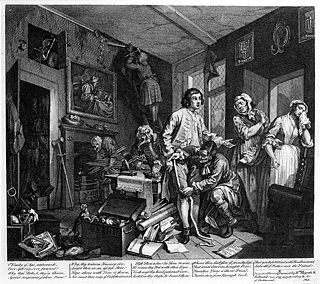
Inheritance is the practice of receiving private property, titles, debts, entitlements, privileges, rights, and obligations upon the death of an individual. The rules of inheritance differ among societies and have changed over time. Officially bequeathing private property and/or debts can be performed by a testator via will, as attested by a notary or by other lawful means.
This aims to be a complete article list of economics topics:

Behavioral economics studies the effects of psychological, cognitive, emotional, cultural and social factors on the decisions of individuals or institutions, such as how those decisions vary from those implied by classical economic theory.

In sociology and in economics, the term conspicuous consumption describes and explains the consumer practice of buying and using goods of a higher quality, price, or in greater quantity than practical. In 1899, the sociologist Thorstein Veblen coined the term conspicuous consumption to explain the spending of money on and the acquiring of luxury commodities specifically as a public display of economic power—the income and the accumulated wealth—of the buyer. To the conspicuous consumer, the public display of discretionary income is an economic means of either attaining or of maintaining a given social status.
A dowry is a payment, such as property or money, paid by the bride's family to the groom or his family at the time of marriage. Dowry contrasts with the related concepts of bride price and dower. While bride price or bride service is a payment by the groom, or his family, to the bride, or her family, dowry is the wealth transferred from the bride, or her family, to the groom, or his family. Similarly, dower is the property settled on the bride herself, by the groom at the time of marriage, and which remains under her ownership and control.

State ownership, also called government ownership and public ownership, is the ownership of an industry, asset, or enterprise by the state or a public body representing a community, as opposed to an individual or private party. Public ownership specifically refers to industries selling goods and services to consumers and differs from public goods and government services financed out of a government's general budget. Public ownership can take place at the national, regional, local, or municipal levels of government; or can refer to non-governmental public ownership vested in autonomous public enterprises. Public ownership is one of the three major forms of property ownership, differentiated from private, collective/cooperative, and common ownership.

The distribution of wealth is a comparison of the wealth of various members or groups in a society. It shows one aspect of economic inequality or economic heterogeneity.

Andrei Shleifer is a Russian-American economist and Professor of Economics at Harvard University, where he has taught since 1991. Shleifer was awarded the biennial John Bates Clark Medal in 1999 for his seminal works in three fields: corporate finance, the economics of financial markets, and the economics of transition.
Entitlement theory is a theory of distributive justice and private property created by Robert Nozick in chapters 7 and 8 of his book Anarchy, State, and Utopia. The theory is Nozick's attempt to describe "justice in holdings" —or what can be said about and done with the property people own when viewed from a principle of justice.
A market anomaly in a financial market is predictability that seems to be inconsistent with theories of asset prices. Standard theories include the capital asset pricing model and the Fama-French Three Factor Model, but a lack of agreement among academics about the proper theory leads many to refer to anomalies without a reference to a benchmark theory. Indeed, many academics simply refer to anomalies as "return predictors", avoiding the problem of defining a benchmark theory.
Historically, a bequest is personal property given by will and a devise is real property given by will. Today, the two words are often used interchangeably.

In economics, a market is a composition of systems, institutions, procedures, social relations or infrastructures whereby parties engage in exchange. While parties may exchange goods and services by barter, most markets rely on sellers offering their goods or services to buyers in exchange for money. It can be said that a market is the process by which the prices of goods and services are established. Markets facilitate trade and enable the distribution and allocation of resources in a society. Markets allow any tradeable item to be evaluated and priced. A market emerges more or less spontaneously or may be constructed deliberately by human interaction in order to enable the exchange of rights of services and goods. Markets generally supplant gift economies and are often held in place through rules and customs, such as a booth fee, competitive pricing, and source of goods for sale.
An inheritance tax is a tax paid by a person who inherits money or property of a person who has died, whereas an estate tax is a levy on the estate of a person who has died.

Laurence Jacob Kotlikoff is a Professor of Economics at Boston University, a William Warren Fairfield Professor at Boston University, a Fellow of the American Academy of Arts and Sciences, a Research Associate of the National Bureau of Economic Research, a Fellow of the Econometric Society, and a former Senior Economist on the President's Council of Economic Advisers.

In monetary economics, the demand for money is the desired holding of financial assets in the form of money: that is, cash or bank deposits rather than investments. It can refer to the demand for money narrowly defined as M1, or for money in the broader sense of M2 or M3.

Privatization in Russia describes the series of post-Soviet reforms that resulted in large-scale privatization of Russia's state-owned assets, particularly in the industrial, energy, and financial sectors. Most privatization took place in the early and mid-1990s under Boris Yeltsin, who assumed the presidency following the dissolution of the Soviet Union.
The estate tax in the United States is a federal tax on the transfer of the estate of a person who dies. The tax applies to property that is transferred by will or, if the person has no will, according to state laws of intestacy. Other transfers that are subject to the tax can include those made through a trust and the payment of certain life insurance benefits or financial accounts. The estate tax is part of the federal unified gift and estate tax in the United States. The other part of the system, the gift tax, applies to transfers of property during a person's life.
Historical inheritance systems are different systems of inheritance among various people.

Exploitation of labour is a concept defined as, in its broadest sense, one agent taking unfair advantage of another agent. It denotes an unjust social relationship based on an asymmetry of power or unequal exchange of value between workers and their employers. When speaking about exploitation, there is a direct affiliation with consumption in social theory and traditionally this would label exploitation as unfairly taking advantage of another person because of their inferior position, giving the exploiter the power.
Optimal capital income taxation is a subarea of optimal tax theory which studies the design of taxes on capital income such that a given economic criterion like utility is optimized.
Bernheim, B.D.; Shleifer, A.; Summers L.H. (1985) “The Strategic Bequest Motive” in Journal of Political Economy, Vol 93, No. 6, 1045-1076
Masson, A. and Pestieau P. (1997) “Bequest Motives and Models of Inheritance: A Survey of the Literature” in (Erreygers and Vandevelde eds.) Is Inheritance Legitimate? Ethical and Economic Aspects of Wealth Transfers Springer, Berlin










